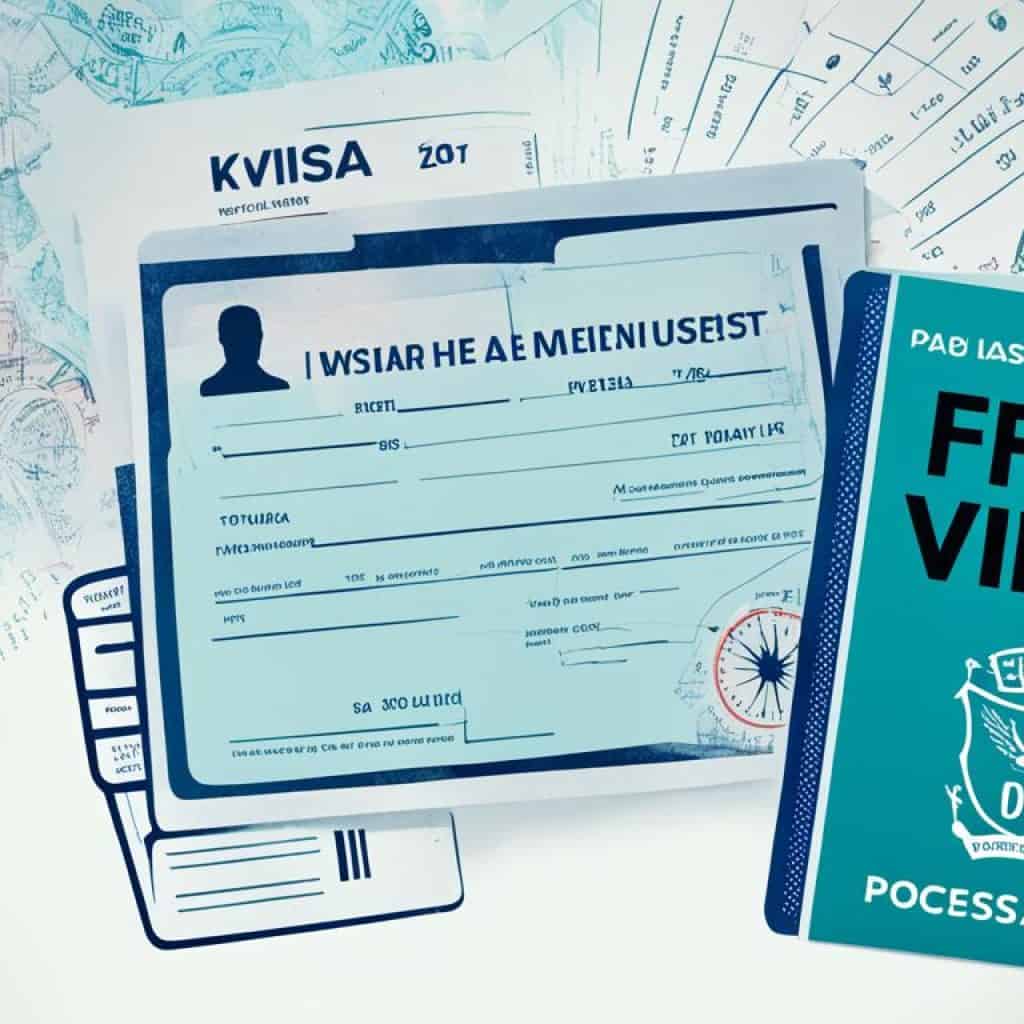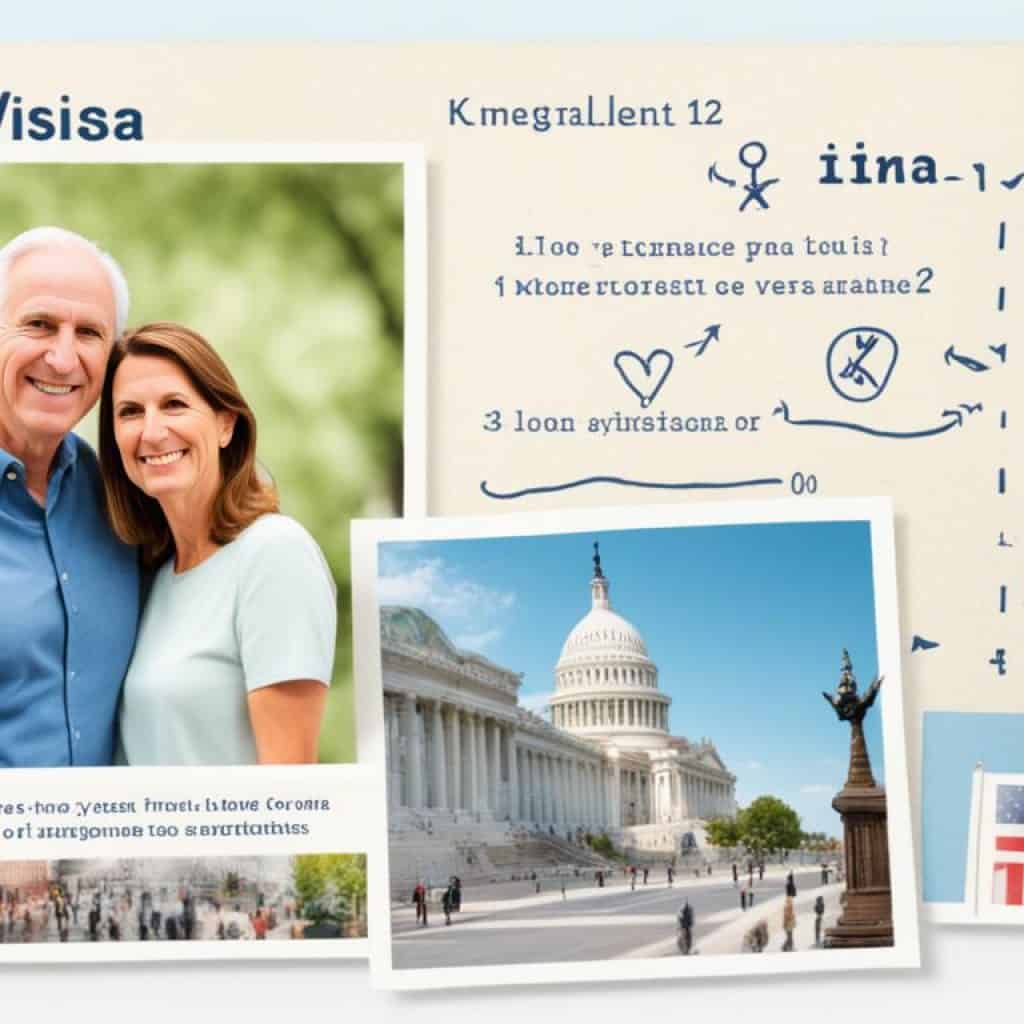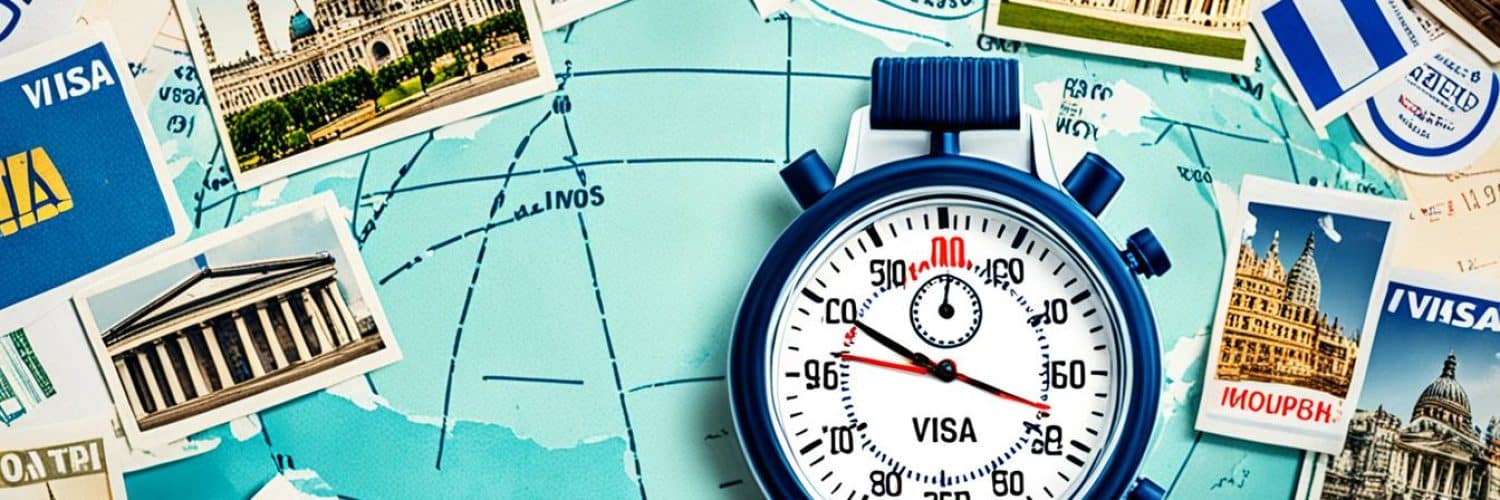Are you planning to bring your fiancé to the United States on a K1 visa? Wondering how long the processing time will be? Let’s explore the average K1 visa processing time and important tips to expedite the process.
In 2023, the average processing time for a K1 visa is 6 months. But is that the whole story? How can you ensure a smooth and speedy approval? Keep reading to find out the essential information you need to know to navigate the K1 visa process effectively.
Key Takeaways:
- The average processing time for a K1 visa in 2023 is 6 months.
- The cost to apply for a K1 visa is $800.
- USCIS received 48,118 Form I-129F applications in FY 2022, with a denial rate of 19.7%.
How Long Does It Take to Process a K1 Visa?
Processing a K1 visa application (Form I-129F) typically takes around 6 months. This estimate is based on analysis by Boundless partner Track My Visa Now, which tracks processing times for various visa applications. Once Form I-129F is approved, it can take an additional four to six weeks for USCIS to forward the case to the National Visa Center.
It’s important to note that processing times may vary depending on individual circumstances, such as the workload of USCIS and the specific details of the case. However, the average wait time for a K1 visa is around six months.
“The processing time for a K1 visa application averages 6 months.”
The K1 visa processing time begins when the U.S. citizen sponsor files Form I-129F with USCIS. This form is used to establish the qualifying relationship between the U.S. citizen and their foreign-citizen fiancé(e). USCIS will review the application and supporting documents to determine eligibility.
Once USCIS approves Form I-129F, the case is forwarded to the National Visa Center (NVC), where additional processing and document collection take place. The NVC will then schedule the visa interview at the U.S. embassy or consulate in the fiancé(e)’s home country.
Overall, the processing time for a K1 visa can be a lengthy process, but being aware of the average wait time can help couples plan and prepare accordingly.
Factors That Can Affect K1 Visa Processing Time
- Completeness of the application: Ensuring that you submit all required documents and information with your application can help avoid delays.
- Background checks: USCIS conducts thorough background checks on both the U.S. citizen sponsor and the foreign-citizen fiancé(e). Any issues or discrepancies discovered during these checks can prolong the processing time.
- Case complexity: Certain circumstances, such as criminal records, previous visa denials, or red flags in the application, can require additional scrutiny and lengthen the processing time.
- USCIS workload: The volume of applications being processed by USCIS can impact the overall processing time. During peak periods or times of increased demand, processing times may be longer.
It’s essential to stay patient and follow the instructions provided by USCIS throughout the K1 visa application process. Keeping a close eye on processing times and staying informed can help couples manage expectations and plan for their future together.
K1 Visa Processing Steps
Processing a K1 visa involves several important steps that applicants must follow to ensure a successful application. Understanding these steps can help couples navigate the process smoothly and efficiently.
- Form I-129F: The first step in the K1 visa process is for the U.S. citizen sponsor to file Form I-129F. This form is used to establish a qualifying relationship between the U.S. citizen and their foreign-citizen fiancé.
- Form DS-160 and interview: After Form I-129F is approved by USCIS, the foreign fiancé must complete Form DS-160, which is the application for a nonimmigrant visa. Additionally, they must attend a visa interview at the U.S. embassy or consulate in their home country. The interview is an essential part of the process and allows the consular officer to assess the couple’s relationship and eligibility for the K1 visa.
- Arrival and marriage: If the K1 visa is approved, the foreign fiancé will receive their visa and can now enter the United States. Upon arrival, they have 90 days to get married to their U.S. citizen sponsor. It is important to note that the marriage must take place within this timeframe to maintain legal status in the U.S.
By following these K1 visa processing steps, couples can move forward in their journey to be together and start their lives in the United States.
| Step | Description |
|---|---|
| Form I-129F | The U.S. citizen fiancé files this form to establish a qualifying relationship. |
| Form DS-160 and interview | The foreign fiancé completes the DS-160 form and attends a visa interview at the U.S. embassy or consulate. |
| Arrival and marriage | After the K1 visa is approved, the foreign fiancé has 90 days to enter the U.S. and get married. |
K1 Visa Processing Steps Overview:
- Form I-129F: Establish a qualifying relationship by filing this form.
- Form DS-160 and interview: Complete the application and attend the visa interview at the U.S. embassy or consulate.
- Arrival and marriage: Enter the U.S. with the approved K1 visa and get married within 90 days.
K1 Visa Eligibility
To be eligible for a K1 visa, the U.S. citizen sponsor must meet certain requirements:
- Marital Status: The U.S. citizen sponsor must be unmarried when filing the visa petition.
- Intent to Marry: Both the U.S. citizen sponsor and their foreign-citizen fiancé must have a genuine intention to marry within 90 days of the fiancé’s arrival in the U.S.
- Income Requirements: The U.S. citizen sponsor must meet the income requirements set by USCIS to demonstrate the ability to financially support their fiancé. These requirements are based on the U.S. poverty guidelines and depend on the sponsor’s household size.
- Relationship Validity: The couple must provide evidence to prove the validity of their relationship, showing that they have a bona fide intention to get married and build a life together.
- In-Person Meeting: The U.S. citizen sponsor and their foreign-citizen fiancé must have met in person at least once within the two years before submitting Form I-129F, the petition for a K1 visa.
Meeting these eligibility criteria is essential for a successful K1 visa application.

K1 Visa Cost
Applying for a K1 visa involves certain costs that applicants need to be aware of. Understanding the breakdown of these expenses will help you plan your budget accordingly. The total cost for a K1 visa is $800, which covers various fees and additional expenses. Let’s take a closer look at the details:
Government Fees:
The government requires a fee of $535 for filing Form I-129F, which is the primary form for the K1 visa application. This fee is non-refundable, even if your application is not approved. It is essential to ensure all the information provided in the form is accurate and complete to avoid unnecessary complications.
Medical Exam Fee:
As part of the K1 visa process, the foreign fiancé(e) is required to undergo a medical examination. This examination is conducted by an authorized physician and ensures that the applicant is fit for travel and does not pose any health risks to the United States. The medical exam fee typically ranges around $200, but this cost may vary depending on the location and healthcare provider.
K1 Visa Application Fee:
In addition to the government filing fee, there is also an application fee of $265 specifically for the K1 visa. This fee is payable to the U.S. embassy or consulate where the visa interview takes place. It covers the administrative costs associated with processing the application.
Additional Expenses:
While the aforementioned fees encompass the main costs associated with the K1 visa process, there may be additional expenses that applicants should consider. These can include translating and photocopying documents, obtaining required documents such as a birth certificate, and any other miscellaneous expenses that may arise during the application process.
It’s important to carefully plan your finances and allocate the necessary funds to cover these expenses. Being aware of the costs involved will help you navigate the K1 visa process more smoothly and avoid any financial surprises along the way.
K1 Visa Denial Rate
When applying for a K1 visa, it’s crucial to be aware of the denial rate to ensure a successful application. The denial rate for K1 visa applications stands at 19.7%, which means that nearly 20% of all Form I-129F applications were denied by USCIS in FY 2022. Out of the 48,118 applications received, 9,492 were not approved.
To avoid becoming part of this statistic, it’s essential to carefully prepare and submit all required documents. By meticulously following the guidelines and ensuring that every piece of evidence is provided, you can significantly increase your chances of approval.
Submitting a complete and well-documented application package will demonstrate your eligibility and genuine relationship, helping the USCIS officers make an informed decision. Adequate preparation and attention to detail can make a significant difference in avoiding a K1 visa denial.
“It’s important to remember that a K1 visa denial can be a setback, leading to prolonged separation and additional expenses for the couple. By understanding the reasons for denial and taking the necessary precautions, applicants can minimize the chances of facing a rejection.”
Reasons for K1 Visa Denials
There are several reasons why a K1 visa application may be denied. Common reasons for denial include:
- Ineligibility: Failure to meet the eligibility criteria, such as being unmarried or not intending to marry within 90 days of arrival in the U.S.
- Insufficient Evidence: Lack of evidence to establish a genuine relationship or failure to prove that the couple has met in person within the two years preceding the application.
- Failure to Comply with Form I-129F Instructions: Incomplete or incorrectly filled out forms, missing signatures, or failure to include required supporting documents.
- Criminal Background: Involvement in criminal activities or possessing a criminal record may result in visa denial.
It’s crucial to thoroughly review the USCIS guidelines and instructions to ensure the application is error-free and complete. Seeking professional assistance from immigration attorneys or consultants can also help prevent these common reasons for denial.
K1 Visa Denial Prevention Tips
To increase the chances of a successful K1 visa application and avoid potential denial, consider the following tips:
- Start the process early: Begin gathering documentation and preparing the application well in advance to allow ample time for review and rectification if needed.
- Follow instructions carefully: Read and follow the USCIS guidelines for Form I-129F and the visa interview process meticulously.
- Submit thorough evidence: Provide comprehensive evidence of your genuine relationship, including photos, correspondence, and supporting documents.
- Prepare for the interview: Familiarize yourself with potential interview questions and practice your responses to establish confidence and clarity during the interview.
- Seek professional assistance: Consider consulting an immigration attorney or experienced consultant to guide you through the application process and ensure compliance with all requirements.
Taking these preventative measures will help minimize the risk of a K1 visa denial and increase your chances of a successful application.
| Year | Number of K1 Visa Applications | Number of Denials | Denial Rate |
|---|---|---|---|
| 2022 | 48,118 | 9,492 | 19.7% |
| 2021 | 44,726 | 8,214 | 18.4% |
| 2020 | 46,935 | 7,863 | 16.8% |
Two-Year Rule for K1 Visa
The Two-Year Rule is a crucial requirement in the K1 visa process. This rule stipulates that, before submitting Form I-129F, the U.S. citizen sponsor and the foreign-citizen fiancé must provide concrete evidence of meeting in person at least once within the two years preceding the submission. This requirement serves as a way to ensure the authenticity and validity of the relationship, offering reassurance to the authorities that the marriage intentions are genuine.
However, there are exceptions to the Two-Year Rule. In cases where meeting in person within the designated timeframe is impossible due to religious or cultural conflicts, or substantial hardship for the foreign-citizen fiancé, a waiver can be requested. These exceptions recognize the unique circumstances that could prevent a face-to-face meeting and provide a pathway for genuine couples to navigate the K1 visa process without this particular requirement.
“The Two-Year Rule is a fundamental aspect of the K1 visa process, ensuring that couples have taken the necessary steps to meet in person and solidify their relationship before embarking on the journey towards marriage in the United States.”
Proper documentation and documentation of the meeting are essential when applying for a K1 visa. Photos, flight itineraries, passport stamps, and other forms of proof are commonly used. USCIS and the U.S. embassy or consulate need these records to verify compliance with the Two-Year Rule and assess the credibility of the couple’s relationship.
Adhering to the Two-Year Rule is of utmost importance to demonstrate the authenticity of your relationship and to ensure a smooth and successful K1 visa application process.
Exceptions to the Two-Year Rule
| Exception | Description |
|---|---|
| Religious or Cultural Conflicts | In cases where meeting in person within the two-year timeframe is contrary to religious or cultural beliefs or practices of the foreign-citizen fiancé, they may request an exception to the Two-Year Rule. |
| Severe Hardship | If meeting in person within the two-year period would result in extreme difficulty or hardship for the foreign-citizen fiancé, they can request an exception to the Two-Year Rule. |

Waiver of the Two-Year Rule
If the U.S. citizen and foreign-citizen fiancé(e) did not meet in the previous two years, they may request a waiver of the Two-Year Rule. This request should be submitted with Form I-129F and must include evidence that arranging the meeting was extremely difficult or impossible.
Meeting the Two-Year Rule requirement is typically a crucial step in obtaining a K1 visa. However, in certain circumstances where meeting in person is not possible or poses significant challenges, a waiver may be granted.
The U.S. citizen and foreign-citizen fiancé(e) must provide compelling evidence to support their waiver request. This evidence can include documentation such as emails, text messages, or phone records that demonstrate the genuine nature of the relationship and the difficulty in arranging a meeting within the past two years.
“Despite not meeting in person within the last two years, our love and commitment to each other remain unwavering. The inability to meet was due to unforeseen circumstances beyond our control, but we have maintained a strong connection through constant communication and shared experiences. Our genuine love and desire to be together are evident, and we kindly request a waiver of the Two-Year Rule to proceed with our K1 visa application.”
It’s important to note that each case is evaluated individually, and the decision to grant a waiver lies with the USCIS. Meeting the Two-Year Rule requirement is generally preferred, but with a well-constructed waiver request and strong evidence, couples may still have the opportunity to pursue their K1 visa.
Key Points about the Waiver of the Two-Year Rule
| Key Points | Details |
|---|---|
| Who can request a waiver? | The U.S. citizen and foreign-citizen fiancé(e) who did not meet in the previous two years. |
| Required documentation | Evidence proving that arranging the meeting was extremely difficult or impossible. |
| Examples of evidence | Emails, text messages, phone records, and other documentation demonstrating the genuine nature of the relationship and the challenges faced in arranging a meeting. |
| Decision authority | The USCIS evaluates waiver requests on a case-by-case basis and determines whether to grant the waiver. |
| Outcome of a successful waiver | If the waiver is granted, the couple can proceed with their K1 visa application. |
Securing a waiver of the Two-Year Rule can be a lifeline for couples who have faced exceptional circumstances preventing them from meeting within the specified timeframe. It’s essential to present a compelling case with strong evidence to increase the chances of a favorable decision. Remember, each case is unique, and the USCIS assesses waiver requests on an individual basis.
K1 Visa Interview and Processing Times
The K1 visa interview is a crucial step in the visa application process. It’s an opportunity for the U.S. embassy or consulate to assess the genuineness of the relationship between the U.S. citizen sponsor and their foreign-citizen fiancé(e). Here’s what you need to know about the K1 visa interview and processing times.
What to Expect During the K1 Visa Interview
The K1 visa interview is typically scheduled approximately 4-8 weeks after submitting the required embassy documents. During the interview, the consular officer will ask questions about the couple’s relationship and their plans for marriage in the U.S. It’s essential to provide honest and consistent answers to demonstrate the authenticity of the relationship.
Here are a few tips to help you prepare for a successful K1 visa interview:
- Review your application and supporting documents to familiarize yourself with the information.
- Practice answering potential interview questions with your fiancé(e).
- Bring all required documents to the interview, including the original copies.
- Dress appropriately and professionally to make a good impression.
- Stay calm, confident, and respectful throughout the interview process.
By adequately preparing for the interview, you can increase your chances of a favorable outcome.
Average Processing Time for the K1 Visa Interview
The current average processing time for the K1 visa interview is approximately 1 month. However, it’s important to note that processing times can vary depending on the specific country and the workload of the embassy or consulate. Some factors that can affect processing times include:
- The volume of visa applications received
- The complexity of individual cases
- The efficiency of the embassy or consulate
It’s advisable to check the specific processing times for your country and consulate to have a better understanding of the expected timeline.
K1 Visa Processing Times by Country
| Country | Average Processing Time (Months) |
|---|---|
| United Kingdom | 2 |
| Canada | 3 |
| Australia | 1.5 |
| Germany | 2.5 |
| India | 4 |
Note: The above processing times are approximate and subject to change. Please consult the official website of the U.S. embassy or consulate in your country for the most up-to-date information.
K1 Visa Application Fees
When applying for a K1 visa, it’s important to understand the associated application fees. The total cost for a K1 visa is $800, which includes several components:
- Form I-129F Fee: The government requires a fee of $535 to file Form I-129F, the Petition for Alien Fiancé(e). This form establishes the qualifying relationship between the U.S. citizen sponsor and their foreign-citizen fiancé(e).
- Medical Exam Fee: Typically, a medical examination is required as part of the visa application process. The cost for this exam can vary, but it is typically around $200. It’s important to consult with a designated physician to determine the exact fee.
- K1 Visa Application Fee: Lastly, there is a fee of $265 for the K1 visa application itself. This fee is paid to the U.S. Department of State and covers the processing of the visa application.
It’s important to note that specific instructions regarding the time and place of payment can vary by home country. Applicants should carefully review the instructions provided by their local U.S. embassy or consulate.
Here is a table summarizing the K1 visa application fees:
| Description | Fee |
|---|---|
| Form I-129F Fee | $535 |
| Medical Exam Fee | Around $200 |
| K1 Visa Application Fee | $265 |
| Total Cost | $800 |
Properly understanding and budgeting for the K1 visa application fees is an important step in the process. By ensuring all necessary fees are paid in a timely manner, applicants can enhance the efficiency of their visa application.
Adjusting Status from K1 Visa to Marriage Green Card
Once you and your fiancé have tied the knot, the next step is to adjust your status from a K1 visa holder to a permanent resident by obtaining a marriage-based green card. This process allows you to live and work in the United States indefinitely.
To initiate the adjustment of status, the U.S. citizen sponsor must file Form I-485, Application to Adjust Status, with the United States Citizenship and Immigration Services (USCIS). This form is used to request permanent residency and should be submitted along with the necessary supporting documents.
The Timeline for Adjusting Status
The timeline for adjusting status from a K1 visa to a marriage green card can vary. Currently, the average processing time ranges from 13.5 to 20.5 months. It’s important to note that this estimate is subject to change and individual circumstances may impact processing times.
During the adjustment of status process, you may be required to attend an interview with USCIS to provide additional supporting evidence and answer any questions they may have about your relationship. It’s crucial to thoroughly prepare for this interview and bring all relevant documentation to support your marriage.
The Importance of Timely Adjustment
Adjusting your status in a timely manner is crucial to ensure that you maintain legal immigration status in the United States. Once your K1 visa expires, it’s essential to have a valid green card to continue living and working in the country.
It’s important to note that if you fail to adjust your status before the expiration of your K1 visa, you may risk accruing unlawful presence and potentially face immigration consequences. Therefore, it’s highly recommended to begin the adjustment process as soon as possible after getting married.
By diligently following the necessary steps and meeting all requirements, you can successfully transition from a K1 visa holder to obtaining a marriage-based green card, granting you permanent residency and the opportunity to build a life together in the United States.
K1 Visa Application Rejections and Appeals
When applying for a K1 visa, there is always a possibility of rejection. Receiving a rejection can be disheartening, but it’s important not to lose hope. Understanding the reasons behind K1 visa rejections and knowing the options for appeal can help navigate through this challenging process.
Reasons for K1 Visa Rejections:
- Incomplete or incorrect documentation
- Failure to meet the eligibility requirements
- Insufficient evidence of a bona fide relationship
- Issues with the medical examination
- Previous immigration violations or criminal history
If your K1 visa petition is rejected, it can significantly delay the overall processing time. To avoid rejections, it’s crucial to carefully prepare and submit all required documents. Ensure that all forms are filled out correctly, provide thorough evidence of your relationship, and address any potential red flags.
“Taking the time to double-check your application and seek guidance from immigration experts can greatly increase the chances of a successful K1 visa application.”
Options for Appeal:
If your petition is denied, you may have the option to appeal the decision. It’s important to carefully review the denial notice and understand the specific reasons for the denial. Consulting with an immigration attorney can provide valuable guidance on the best approach for your appeal.
During the appeal process, you will typically need to submit a Form I-290B, Notice of Appeal or Motion, along with any additional evidence that addresses the reasons for the denial. The appeal process can vary depending on the specific circumstances of your case and the jurisdiction. It’s important to be proactive, thorough, and timely in your appeal.
Remember, receiving a rejection does not necessarily mean the end of your K1 visa journey. With proper preparation and the right guidance, you can navigate the appeals process and increase your chances of a successful outcome.
Common Reasons for K1 Visa Rejections
| Reason | Description |
|---|---|
| Incomplete or incorrect documentation | Missing or inaccurate forms, supporting documents, or signatures |
| Failure to meet eligibility requirements | Not being unmarried, unable to prove intent to marry within 90 days, or not meeting income requirements |
| Insufficient evidence of a bona fide relationship | Lack of documentation showing shared residence, financial responsibilities, or shared experiences |
| Issues with the medical examination | Presence of certain medical conditions or failure to complete the required medical tests |
| Previous immigration violations or criminal history | Prior visa overstays, unauthorized work, fraud, or certain criminal convictions |
K1 Visa Processing Time Statistics
When planning to apply for a K1 visa, one of the most crucial factors to consider is the processing time. Understanding the average processing time can help you effectively plan your immigration journey and manage your expectations. Let’s take a closer look at the K1 visa processing time statistics.
Based on the USCIS processing times for Form I-129F, the average processing time for a K1 visa application is currently 13.3 months. However, it’s important to note that this is just an average and can vary significantly depending on individual cases and the workload of USCIS.
Partnering with Track My Visa Now, we have access to their data and analysis, which indicates that the average processing time for a K1 visa is 6 months. This estimate is based on a comprehensive analysis of recent cases, providing a more updated and realistic timeline for K1 visa applicants.
It’s worth mentioning that processing times are subject to change and can be influenced by various factors, such as the complexity of the case, the accuracy of the submitted documents, and the current workload of USCIS. Therefore, it’s essential to stay informed about any updates or changes in processing times that may affect your application.

Planning ahead and being well-prepared can help streamline the application process and potentially reduce the processing time. It’s advisable to gather all the required documents, fill out the forms accurately, and submit your application as early as possible to avoid any unnecessary delays.
By staying informed and proactive, you can navigate the K1 visa process with confidence and increase your chances of a successful application.
Total Cost of K1 Visa Process
Obtaining a K1 visa involves several expenses, from government fees to additional costs. Here is a breakdown of the total cost:
Government Fees*
| Fee | Amount (USD) |
|---|---|
| Form I-129F | $535 |
| Medical Exams | Around $200 |
| K1 Visa Application | $265 |
*Government fees are subject to change. Please verify the current fees on the official USCIS website.
Additional Costs
- Translating and photocopying documents
- Obtaining required documents, such as birth certificates
- Travel expenses for the foreign-citizen fiancé(e) to attend the visa interview
- Documentation and mailing fees
- Other miscellaneous expenses
It’s important to budget for these costs to ensure a smooth and successful K1 visa application process.
Conclusion
Processing times for K1 visas can vary based on individual cases, but on average, it takes approximately 6 months from filing Form I-129F to receiving approval. This estimate is supported by data from USCIS and our partner, Track My Visa Now.
To increase the chances of a successful K1 visa application, it is essential to carefully follow the application process, gather all necessary documents, and meet the eligibility requirements. This includes completing and submitting Form I-129F accurately and providing evidence of a qualifying relationship. Meeting the Two-Year Rule requirement is also crucial, unless a waiver is sought due to extreme difficulty or impossibility.
Remember, the K1 visa process requires patience and attention to detail. Prepare well in advance, ensure all forms are filled out correctly, and provide clear and convincing evidence of your relationship. By doing so, you can expedite the processing time and move closer to being united with your fiancé(e) in the United States.
FAQ
How long does it take to process a K1 visa?
The average processing time for a K1 visa is 6 months, based on data from USCIS and partner Track My Visa Now.
What are the steps in the K1 visa processing?
The steps in the K1 visa processing include filing Form I-129F, completing the DS-160 form, attending a visa interview, and entering the U.S. within 90 days to get married.
What are the eligibility requirements for a K1 visa?
To be eligible for a K1 visa, the U.S. citizen sponsor must be unmarried, intend to marry their foreign-citizen fiancé within 90 days, meet income requirements, and prove the validity of their relationship.
How much does a K1 visa cost?
The total cost for a K1 visa is $800, including government fees for Form I-129F, medical exams, and the K1 visa application.
What is the denial rate for K1 visa applications?
The denial rate for K1 visa applications is 19.7%, based on USCIS data. It’s important to carefully prepare and submit all required documents to increase the chances of approval.
What is the Two-Year Rule for the K1 visa?
The Two-Year Rule requires the U.S. citizen and foreign-citizen fiancé to provide proof of meeting in person at least once within the two years before submitting Form I-129F.
Can the Two-Year Rule be waived for the K1 visa?
Yes, the Two-Year Rule can be waived if the couple can demonstrate that arranging the meeting was extremely difficult or impossible.
How long does the K1 visa interview and processing take?
The K1 visa interview typically takes place approximately 4-8 weeks after submitting embassy documents, with an average processing time of 1 month.
What are the application fees for a K1 visa?
The total cost for a K1 visa is $800, including fees for Form I-129F, medical exams, and the K1 visa application.
How do you adjust status from a K1 visa to a marriage green card?
After getting married, the final step is to apply for a marriage-based green card by filing Form I-485, Application to Adjust Status, with a processing timeline of 13.5-20.5 months.
What happens if a K1 visa application is rejected?
If a K1 visa application is rejected, it can significantly delay the overall processing time. It’s important to carefully prepare and submit all required documents to avoid rejections. There may be options for appeal if a petition is denied.
What are the statistics for K1 visa processing times?
Based on USCIS processing times, the average processing time for Form I-129F is 13.3 months, while partner Track My Visa Now reports an average processing time of 6 months for a K1 visa.
What is the total cost of the K1 visa process?
The total cost for a K1 visa is $800, including government fees and other expenses such as document translation and photocopying.








Add comment